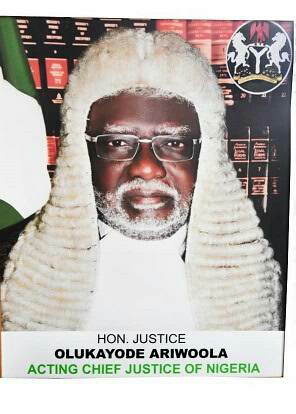My Lord the Chief Justice,
I read with utter consternation, your press statement issued on your behalf by your Director of Press and Information, Festus Akande, wherein you took the unprecedented step to gag the public in criticizing the apex court.
I must hasten to say from the onset that the Supreme Court is one of the institutions of democracy, hence it’s judgments are subject to public scrutiny. What l don’t subscribe to are personal, scurrilous attacks of justices but with the greatest respect my Lord, your judgments are subject to public scrutiny, particularly when they impart on public policy or political processes.
Perhaps, my Lord is oblivious of the perception out there in the public domain, that the Supreme Court in the past couple years has been compromised, compared to the Supreme Court of yore during the time of Kayode Eso, Otutu Obaseki, Adolphus Karibi-Whyte, Chukwudifu Oputa et al. This may not be so but perception is often more stronger than the reality.
In the past 40 years, l have written on the judiciary, right from the time Chief Justices Atanda Fatai-Williams, George Sowemimo, Ayo Irikefe, till date and l haven’t seen a situation where the Supreme Court would attempt to gag members of the public, legal practitioners inclusive, from criticizing the judgments or even conducts of judicial officers. Apart from being an infringement on section 39 of the 1999 constitution (as amended), it portends grave danger to the administration of justice.
I have, in the past risen to defend the judgments of the Supreme Court, not just as articles but in book form. See “The Sokoto Election Debacle and the Supreme Court” (2012) and “In Defence of the Supreme Court: Rivers state Election judgment”(2017).
My Lord, if l defended the Supreme Court in the past by putting issues in proper perspective, beyond emotive vituperation, why wouldn’t l have the locus now to disagree, criticise or even upbraid it’s judgments in respect of the Senatorial seats of Yobe and Akwa Ibom as they relate to Ahmed Lawan and Godswill Akpabio?
As a matter of fact, C.C. Nweze, JSC, who read the lead judgment in the Lawan’s matter has been a long-time friend right from when he was on the High court Bench, Enugu. A cerebral, highly articulate, intellectually deep, incorruptible and uncompromising judicial officer for whom l have tremendous respect. I cannot, by any stretch of imagination denigrate him but l disagree with his judgment and l have the right to disagree and make public. So, why should l be gagged for disagreeing with the majority judgment?
Interestingly, the same highly respected Nweze, JSC, in his lone dissenting judgment in respect of the controversial Imo Governorship judgment of 2020, had stated in his dissent, that the majority judgment “will continue to haunt our electoral jurisprudence for a long time”.
This presupposes that the court’s judgment would have to pass through the litmus test of scholarly and public scrutiny. As a matter of fact, in my analysis of the judgment, l described it as SUPREME INJUSTICE.
In 2008, after the controversial Supreme Court judgment in respect of Amaechi v. Omehia, Gani Fawehinmi (of blessed memory), in his criticism of the judgment, he described it as “perverse”. Heavens didn’t fall. Till now, Nigerians are still debating the propriety of the 1979 twelve two-thirds judgment of the Supreme Court in the Awolowo v. Shagari election. Heavens have not fallen. So, why now?
My Lord, the Supreme Court has a lot to do to change the public perception about it because justice is rooted in public confidence and this cannot be achieved by threats and gagging members of the public from criticizing its judgments.
May l end this letter, my Lord, with these quotes:
“ and court alike are open to criticism and if reasonable argument or expostulation is offered against any judicial act as contrary to law or public good, no court could or would treat that as contempt of court”
-Lord Russel in Reg. v. Gray (1990) 2QB 40.
“Justice has no place in darkness and secrecy. When a judge sits on a case, he himself is on trial…If there is any misconduct on his part, any bias or prejudice, there is a reporter to keep an eye on him”.
-Lord Denning (Address before High court journalists Association, Dec.3, 1964).
“Justice is not a cloistered virtue. She must be allowed to suffer the scrutiny and respectful, even through outspoken comments of ordinary men”.
-Lord Atkin (Ambard v. AG of Trinidad and Tobago (1936) AC 322.
Having said that, with profound respect my Lord, l want to put you on notice that l would criticize the Supreme Court judgments if and when necessary.
My kind regards







